Charles E W Bean, Diaries, AWM38 3DRL 606/273/1 - 1918 - 1937 - Part 5
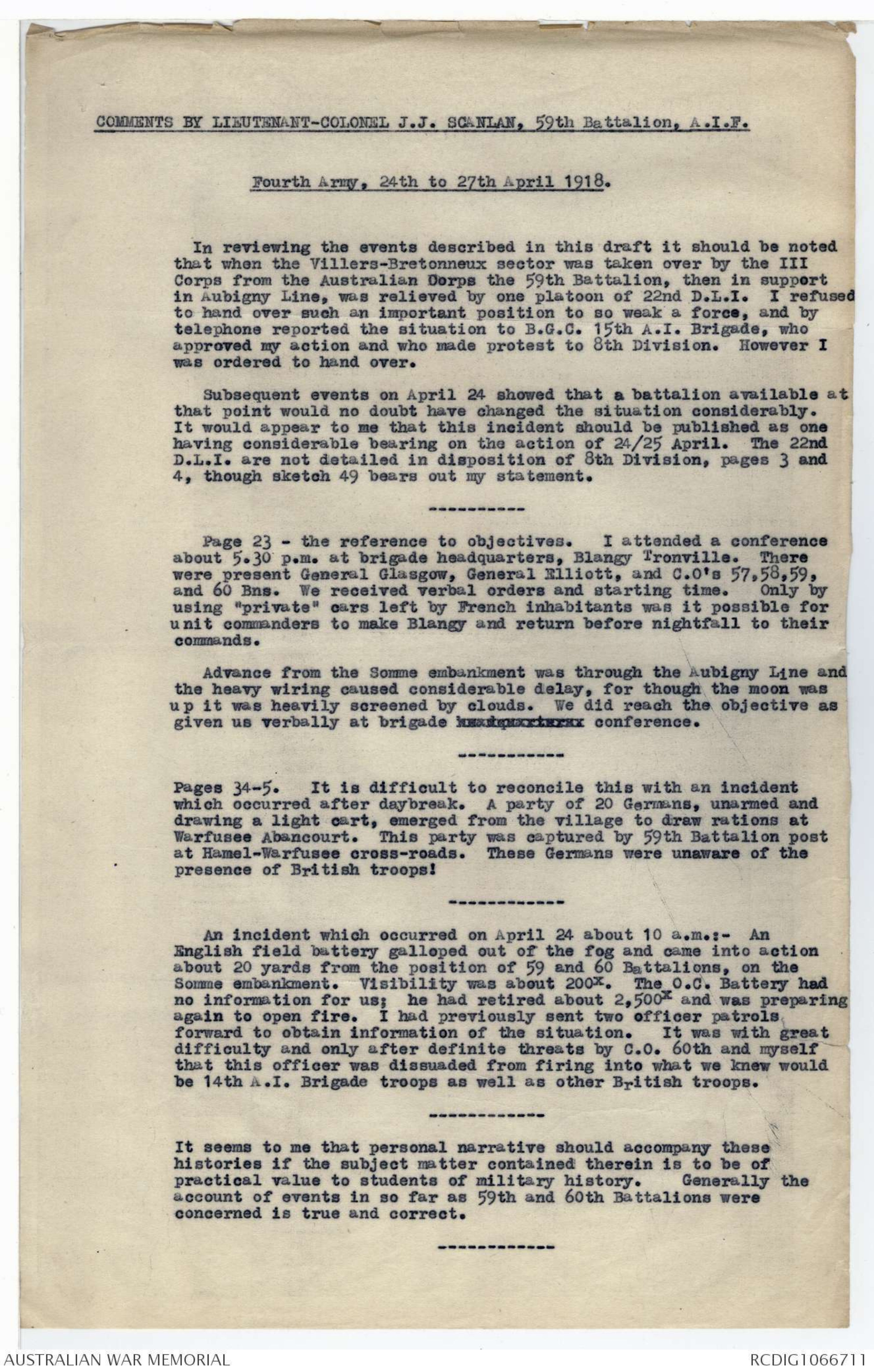
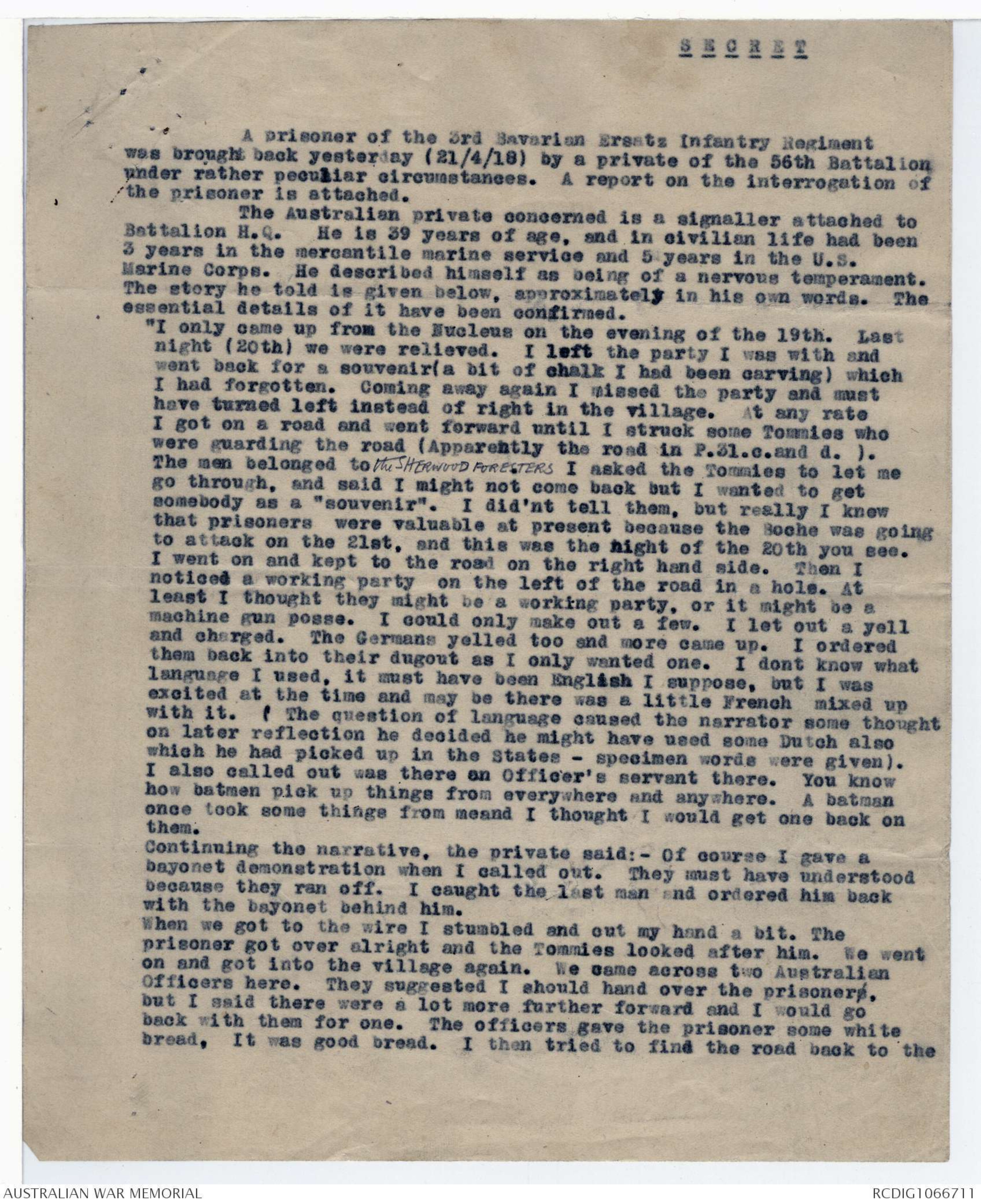
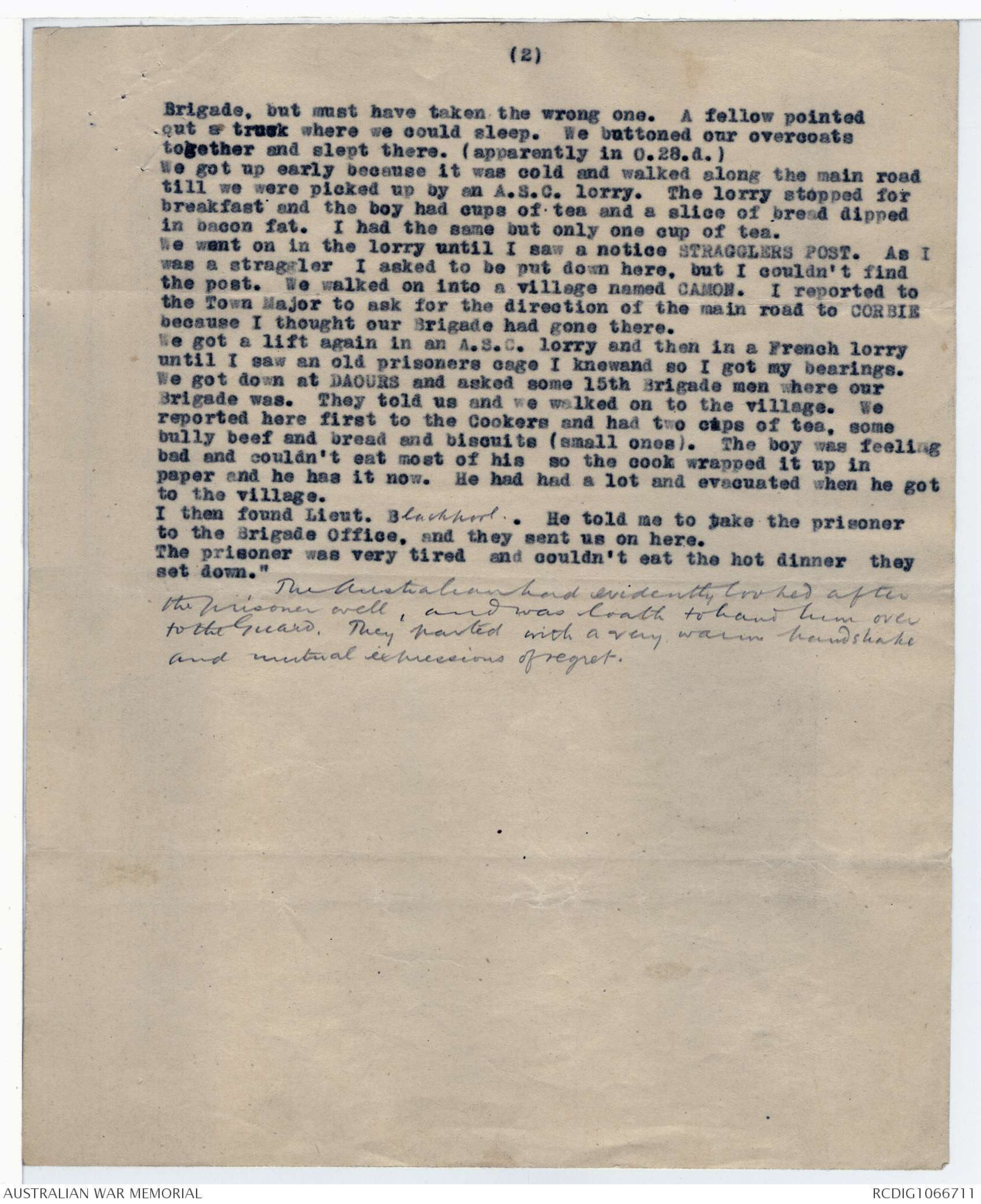
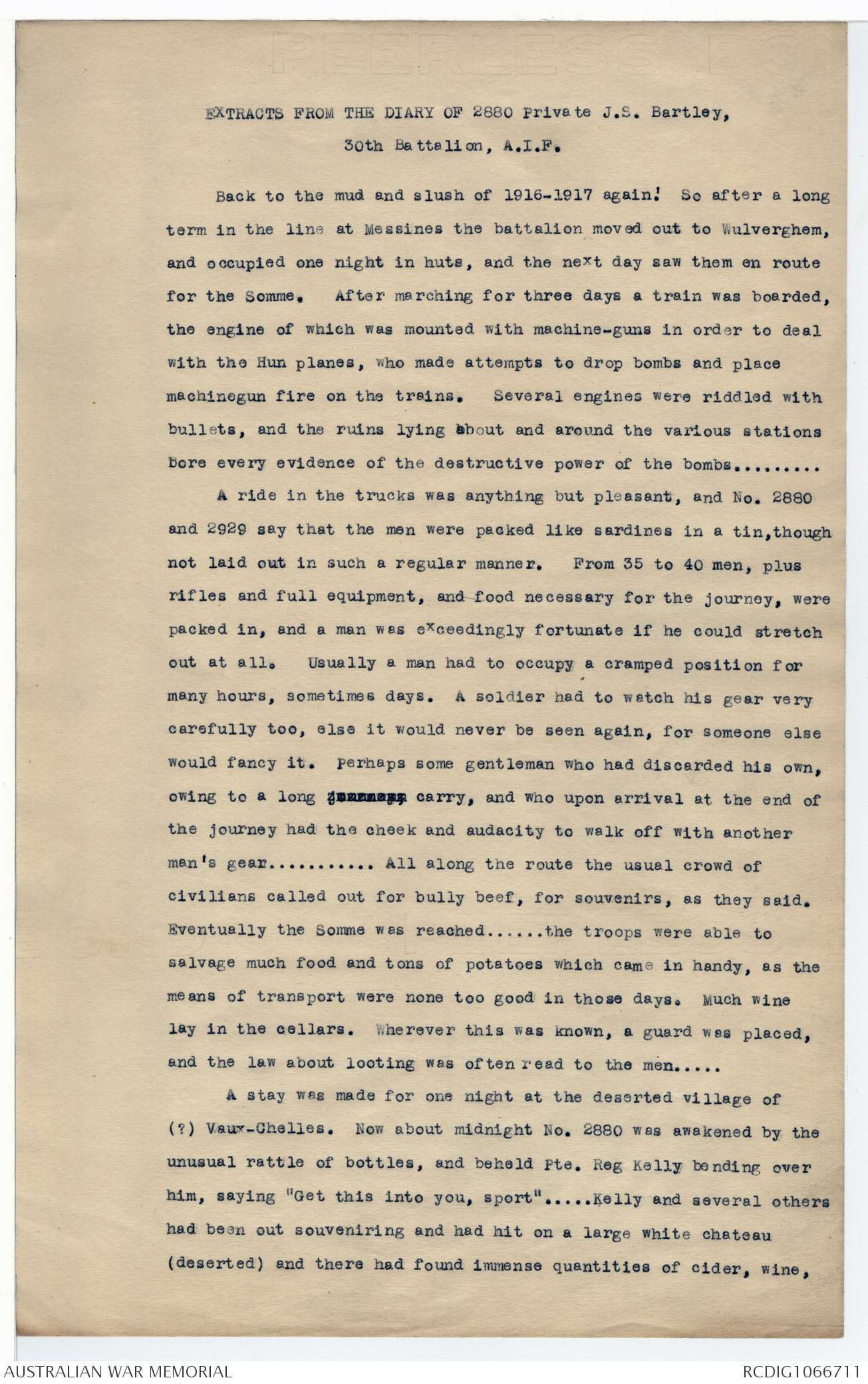
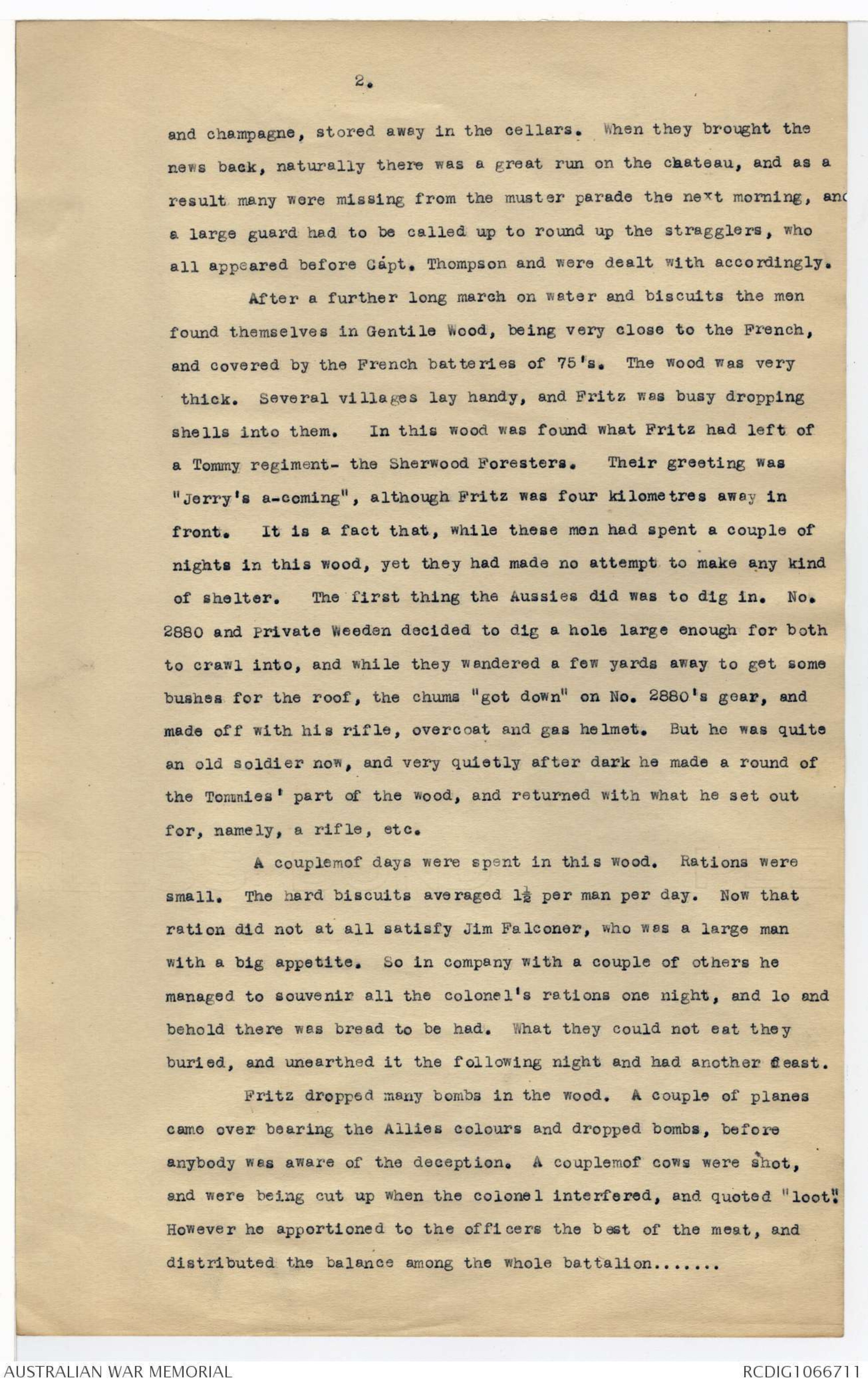
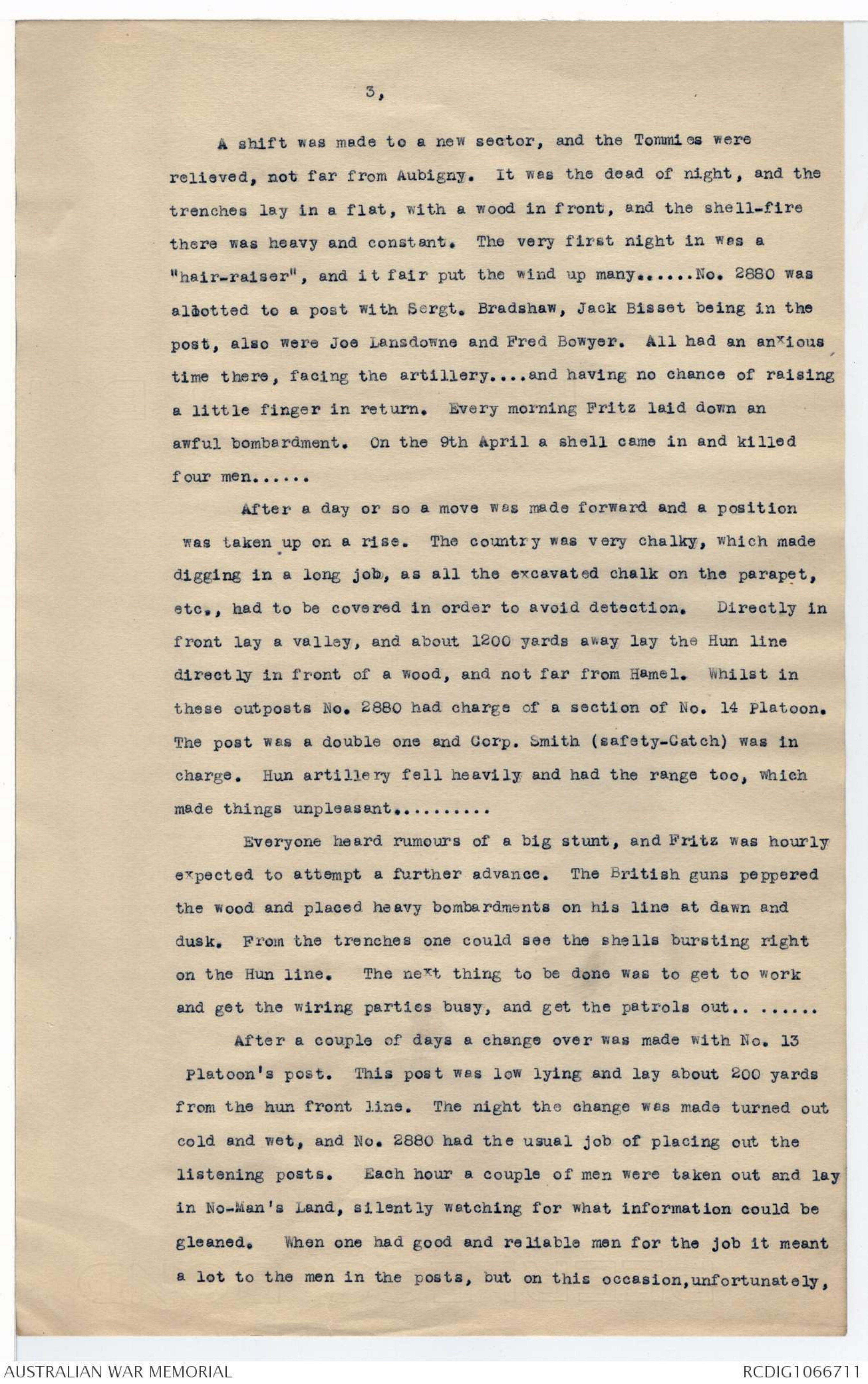
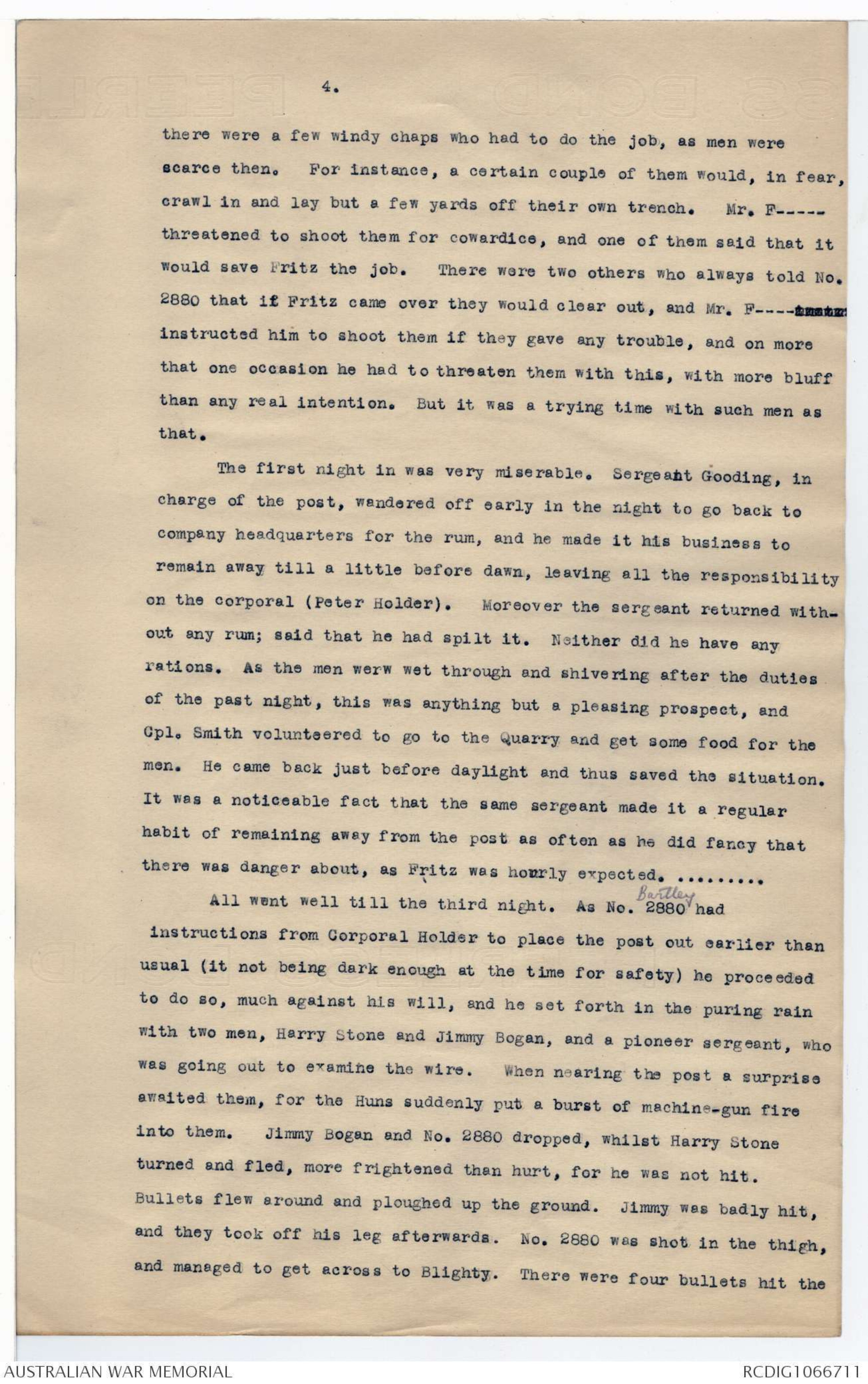
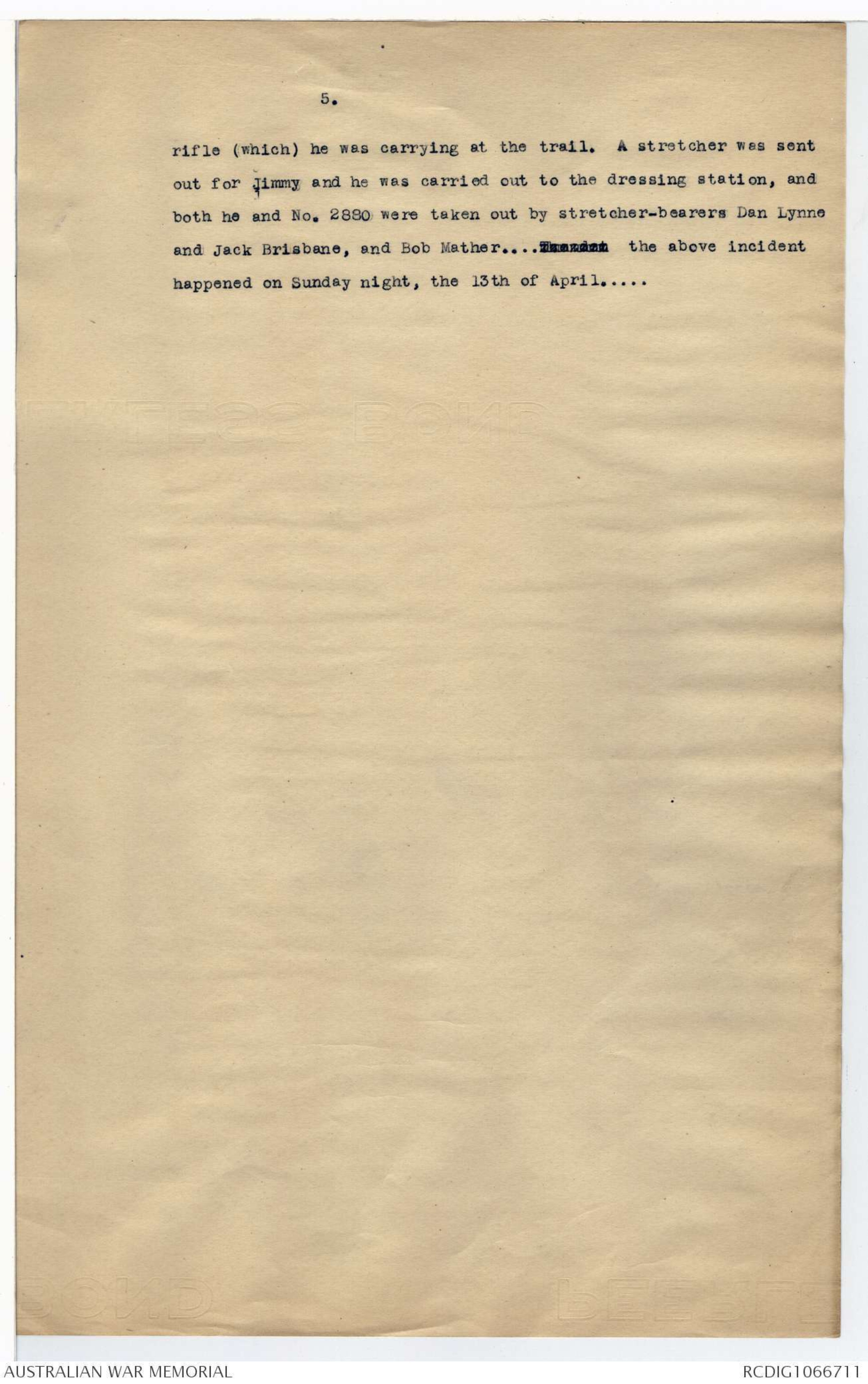
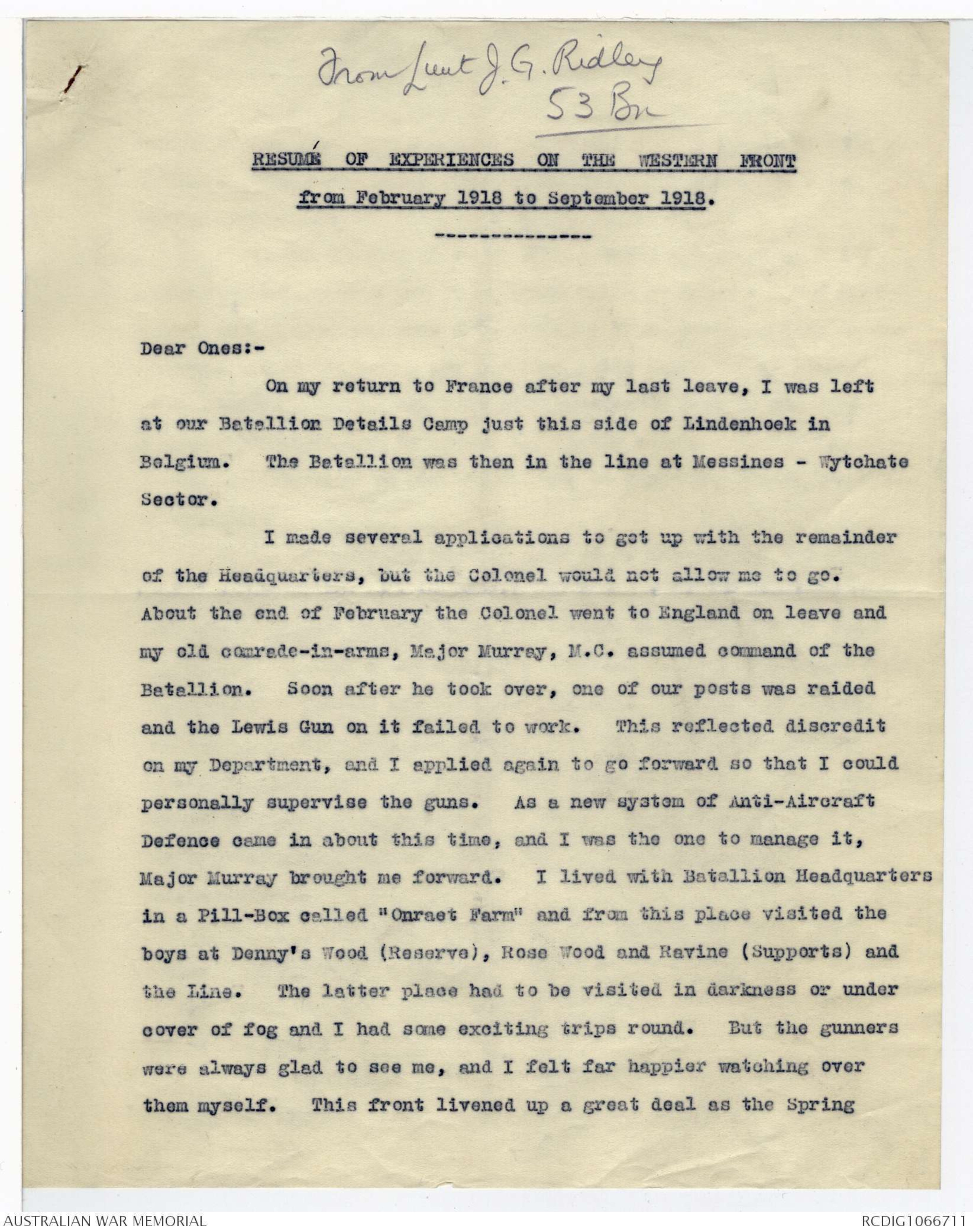
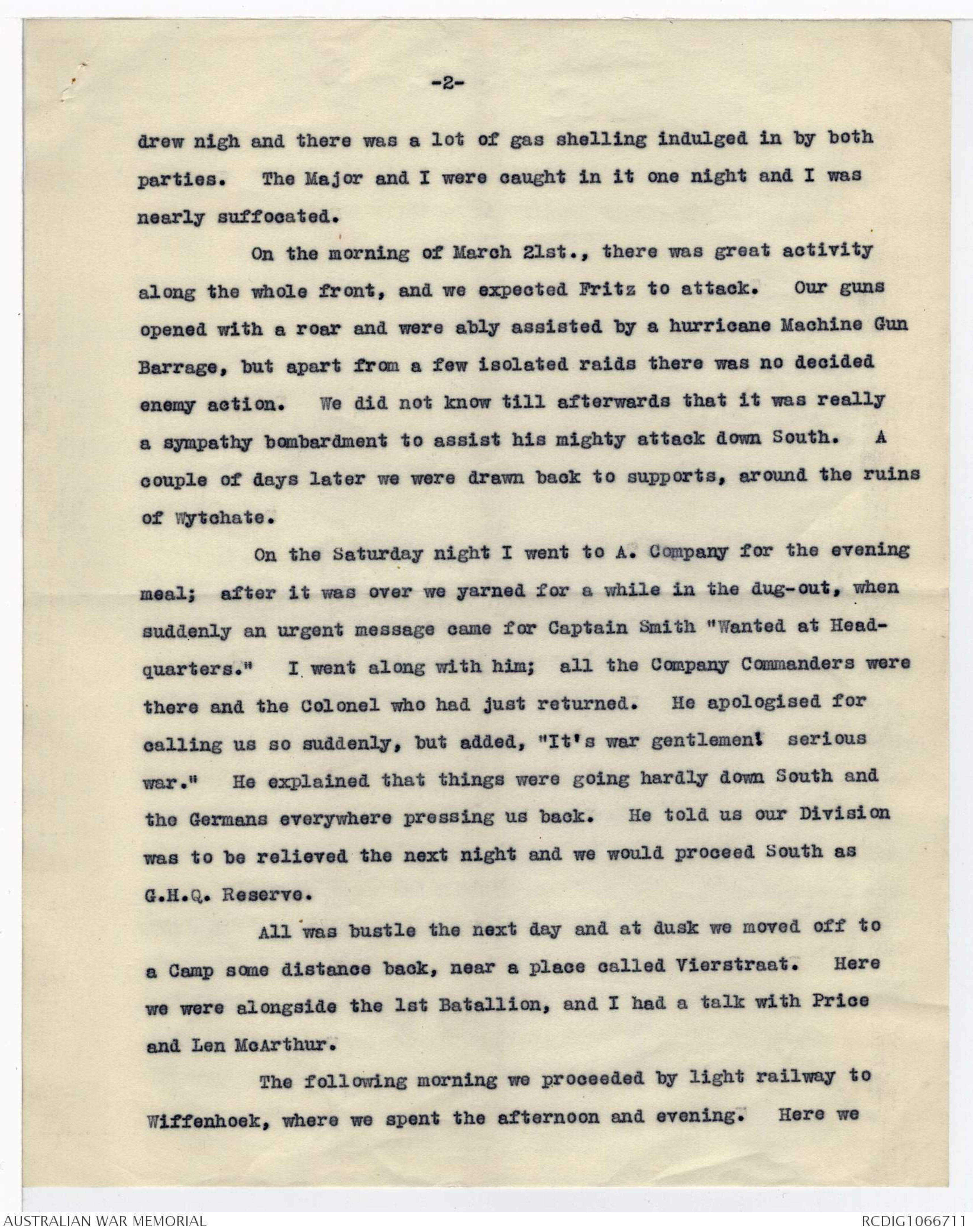
COMMENTS BY LIEUTENANT-COLONEL J.J. SCANLAN, 59th Battalion, A.I.F.
Fourth Army, 24th to 27th April 1918.
In reviewing the events described in this draft it should be noted
that when the Villers-Bretonneux sector was taken over by the III
Corps from the Australian Corps the 59th Battalion, then in support
in Aubigny Line, was relieved by one platoon of 22nd D.L.I. I refused
to hand over such an important position to so weak a force, and by
telephone reported the situation to B.G.C. 15th A.I. Brigade, who
approved my action and who made protest to 8th Division. However I
was ordered to hand over.
Subsequent events on April 24 showed that a battalion available at
that point would no doubt have changed the situation considerably.
It would appear to me that this incident should be published as one
having considerable bearing on the action of 24/25 April. The 22nd
D.L.I. are not detailed in disposition of 8th Division, pages 3 and
4, though sketch 49 bears out my statement.
Page 23 - the reference to objectives. I attended a conference
about 5.30 p.m. at brigade headquarters, Blangy Tronville. There
were present General Glasgow, General Elliott, and C.O's 57, 58, 59,
and 60 Bns. We received verbal orders and starting time. Only by
using "private" cars left by French inhabitants was it possible for
unit commanders to make Blangy and return before nightfall to their
commands.
Advance from the Somme embankment was through the Aubigny Line and
the heavy wiring caused considerable delay, for though the moon was
up it was heavily screened by clouds. We did reach the objective as
given us verbally at brigade xxxxxxxxxxx conference.
Pages 34-5. It is difficult to reconcile this with an incident
which occurred after daybreak. A party of 20 Germans, unarmed and
drawing a light cart, emerged from the village to draw rations at
Warfusee Abancourt. This party was captured by 59th Battalion post
at Hamel-Warfusee cross-roads. These Germans were unaware of the
presence of British troops!
An incident which occurred on April 24 about 10 a.m.:- An
English field battery galloped out of the fog and came into action
about 20 yards from the position of 59 and 60 Battalions, on the
Somme embankment. Visibility was about 200x. The O.C. Battery had
no information for us; he had retired about 2,500x and was preparing
again to open fire. I had previously sent two officer patrols
forward to obtain information of the situation. It was with great
difficulty and only after definite threats by C.O. 60th and myself
that this officer was dissuaded from firing into what we knew would
be 14th A.I. Brigade troops as well as other British troops.
It seems to me that personal narrative should accompany these
histories if the subject matter contained therein is to be of
practical value to students of military history. Generally the
account of events in so far as 59th and 60th Battalions were
concerned is true and correct.
SECRET
A prisoner of the 3rd Bavarian Ersatz Infantry Regiment
was brought back yesterday (21/4/18) by a private of the 56th Battalion
under rather peculiar circumstances. A report on the interrogation of
the prisoner is attached.
The Australian private concerned is a signaller attached to
Battalion H.Q. He is 39 years of age, and in civilian life had been
3 years in the mercantile marine service and 5 years in the U.S.
Marine Corps. He described himself as being of a nervous temperament.
The story he told is given below, approximately in his own words. The
essential details of it have been confirmed.
"I only came up from the Nucleus on the evening of the 19th. Last
night (20th) we were relieved. I left the party I was with and
went back for a souvenir(a bit of chalk I had been carving) which
I had forgotten. Coming away again I missed the party and must
have turned left instead of right in the village. At any rate
I got on a road and went forward until I struck some Tommies who
were guarding the road (Apparently the road in P.31.c.and d. ).
The men belonged to the SHERWOOD FORESTERS. I asked the Tommies to let me
go through, and said I might not come back but I wanted to get
somebody as a "souvenir". I did'nt tell them, but really I knew
that prisoners were valuable at present because the Boche was going
to attack on the 21st, and this was the night of the 20th you see.
I went on and kept to the road on the right hand side. Then I
noticed a working party on the left of the road in a hole. At
least I thought they might be a working party, or it might be a
machine gun posse. I could only make out a few. I let out a yell
and charged. The Germans yelled too and more came up. I ordered
them back into their dugout as I only wanted one. I dont know what
language I used, it must have been English I suppose, but I was
excited at the time and may be there was a little French mixed up
with it. (The question of language caused the narrator some thought
on later reflection he decided he might have used some Dutch also
which he had picked up in the States - specimen words were given).
I also called out was there an Officer's servant there. You know
how batmen pick up things from everywhere and anywhere. A batman
once took some things from meand I thought I would get one back on
them.
Continuing the narrative, the private said:- Of course I gave a
bayonet demonstration when I called out. They must have understood
because they ran off. I caught the last man and ordered him back
with the bayonet behind him.
When we got to the wire I stumbled and out my hand a bit. The
prisoner got over alright and the Tommies looked after him. We went
on and got into the village again. We came across two Australian
Officers here. They suggested I should hand over the prisoners,
but I said there were a lot more further forward and I would go
back with them for one. The officers gave the prisoner some white
bread, it was good bread. I then tried to find the road back to the
( 2 )
Brigade, but must have taken the wrong one.
A fellow pointed
out a truck where we could sleep. We buttoned our overcoats
together and slept there. (apparently in O.28.d.)
We got up early because it was cold and walked along the main road
till we were picked up by an A.S.C. lorry. The lorry stopped for
breakfast and the boy had cups of tea and a slice of bread dipped
in bacon fat. I had the same but only one cup of tea.
We went on in the lorry until I saw a notice STRAGGLERS POST. As I
was a straggler I asked to be put down here, but I couldn't find
the post. We walked on into a village named CAMON. I reported to
the Town Major to ask for the direction of the main road to CORBIE
because I thought our Brigade had gone there.
We got a lift again in an A.S.C. lorry and then in a French lorry
until I saw an old prisoners cage I knowand so I got my bearings.
We got down at DAOURS and asked some 15th Brigade men where our
Brigade was. They told us and we walked on to the village. We
reported here first to the Cookers and had two cups of tea, some
bully beef and bread and biscuits (small ones). The boy was feeling
bad and couldn't eat most of his so the cook wrapped it up in
paper and he has it now. He had had a lot and evacuated when he got
to the village.
I then found Lieut. Blackpool. He told me to take the prisoner
to the Brigade Office, and they sent us on here.
The prisoner was very tired and couldn't eat the hot dinner they
set down."
The Australian had evidently looked after
the prisoner well, and was loath to hand him over
to the Guard. They parted with a very warm handshake
and mutual expressions of regret.
EXTRACTS FROM THE DIARY OF 2880 Private J.S. Bartley,
30th Battalion, A.I.F.
Back to the mud and slush of 1916-1917 again!
So after a long
term in the line at Messines the battalion moved out to Wulverghem,
and occupied one night in huts, and the next day saw them en route
for the Somme. After marching for three days a train was boarded,
the engine of which was mounted with machine-guns in order to deal
with the Hun planes, who made attempts to drop bombs and place
machinegun fire on the trains. Several engines were riddled with
bullets, and the ruins lying about and around the various stations
bore every evidence of the destructive power of the bombs . . .
A ride in the trucks was anything but pleasant, and No. 2880
and 2929 say that the men were packed like sardines in a tin,though
not laid out in such a regular manner. From 35 to 40 men, plus
rifles and full equipment, and food necessary for the journey, were
packed in, and a man was exceedingly fortunate if he could stretch
out at all. Usually a man had to occupy a cramped position for
many hours, sometimes days. A soldier had to watch his gear very
carefully too, else it would never be seen again, for someone else
would fancy it. Perhaps some gentleman who had discarded his own,
owing to a long xxxxxx carry, and who upon arrival at the end of
the journey had the cheek and audacity to walk off with another
man's gear . . . All along the route the usual crowd of
civilians called out for bully beef, for souvenirs, as they said.
Eventually the Somme was reached . . . . the troops were able to
salvage much food and tons of potatoes which came in handy, as the
means of transport were none too good in those days. Much wine
lay in the cellars. Wherever this was known, a guard was placed,
and the law about looting was often read to the men . . .
A stay was made for one night at the deserted village of
(?) Vaux-Chelles. Now about midnight No. 2880 was awakened by the
unusual rattle of bottles, and beheld Pte. Reg Kelly bending over
him, saying "Get this into you, sport" . . . Kelly and several others
had been out souveniring and had hit on a large white chateau
(deserted) and there had found immense quantities of cider, wine,
2.
and champagne, stored away in the cellars. When they brought the
news back, naturally there was a great run on the chateau, and as a
result many were missing from the muster parade the next morning, and
a large guard had to be called up to round up the stragglers, who
all appeared before Capt. Thompson and were dealt with accordingly.
After a further long march on water and biscuits the men
found themselves in Gentile Wood, being very close to the French,
and covered by the French batteries of 75's. The wood was very
thick. Several villages lay handy, and Fritz was busy dropping
shells into them. In this wood was found what Fritz had left of
a Tommy regiment- the Sherwood Foresters. Their greeting was
"Jerry's a-coming", although Fritz was four kilometres away in
front. It is a fact that, while these men had spent a couple of
nights in this wood, yet they had made no attempt to make any kind
of shelter. The first thing the Aussies did was to dig in. No.
2880 and Private Weeden decided to dig a hole large enough for both
to crawl into, and while they wandered a few yards away to get some
bushes for the roof, the chums "got down” on No. 2880's gear, and
made off with his rifle, overcoat and gas helmet. But he was quite
an old soldier now, and very quietly after dark he made a round of
the Tommies' part of the wood, and returned with what he set out
for, namely, a rifle, etc.
A couplemof days were spent in this wood. Rations were
small. The hard biscuits averaged 1½ per man per day. Now that
ration did not at all satisfy Jim Falconer, who was a large man
with a big appetite. So in company with a couple of others he
managed to souvenir all the colonel's rations one night, and lo and
behold there was bread to be had. What they could not eat they
buried, and unearthed it the following night and had another feast.
Fritz dropped many bombs in the wood. A couple of planes
came over bearing the Allies colours and dropped bombs, before
anybody was aware of the deception. A couplemof cows were shot,
and were being cut up when the colonel interfered, and quoted "loot."
However he apportioned to the officers the best of the meat, and
distributed the balance among the whole battalion . . .
3,
A shift was made to a new sector, and the Tommies were
relieved, not far from Aubigny. It was the dead of night, and the
trenches lay in a flat, with a wood in front, and the shell-fire
there was heavy and constant. The very first night in was a
"hair-raiser", and it fair put the wind up many . . . No. 2880 was
allotted to a post with Sergt. Bradshaw, Jack Bisset being in the
post, also were Joe Lansdowne and Fred Bowyer. All had an anxious
time there, facing the artillery . . . and having no chance of raising
a little finger in return. Every morning Fritz laid down an
awful bombardment. On the 9th April a shell came in and killed
four men . . . .
After a day or so a move was made forward and a position
was taken up on a rise. The country was very chalky, which made
digging in a long job, as all the excavated chalk on the parapet,
etc., had to be covered in order to avoid detection. Directly in
front lay a valley, and about 1200 yards away lay the Hun line
directly in front of a wood, and not far from Hamel. Whilst in
these outposts No. 2880 had charge of a section of No. 14 Platoon.
The post was a double one and Corp. Smith (safety-Catch) was in
charge. Hun artillery fell heavily and had the range too, which
made things unpleasant . . . .
Everyone heard rumours of a big stunt, and Fritz was hourly
expected to attempt a further advance. The British guns peppered
the wood and placed heavy bombardments on his line at dawn and
dusk. From the trenches one could see the shells bursting right
on the Hun line. The next thing to be done was to get to work
and get the wiring parties busy, and get the patrols out . . .
After a couple of days a change over was made with No. 13
Platoon's post. This post was low lying and lay about 200 yards
from the hun front line. The night the change was made turned out
cold and wet, and No. 2880 had the usual job of placing out the
listening posts. Each hour a couple of men were taken out and lay
in No-Man's Land, silently watching for what information could be
gleaned. When one had good and reliable men for the job it meant
a lot to the men in the posts, but on this occasion,unfortunately,
4
there were a few windy chaps who had to do the job, as men were
scarce then. For instance, a certain couple of them would, in fear,
crawl in and lay but a few yards off their own trench. Mr. F---
threatened to shoot them for cowardice, and one of them said that it
would save Fritz the job. There were two others who always told No.
2880 that if Fritz came over they would clear out, and Mr. F-– xxxx
instructed him to shoot them if they gave any trouble, and on more
that one occasion he had to threaten them with this, with more bluff
than any real intention. But it was a trying time with such men as
that.
The first night in was very miserable. Sergeant Gooding, in
charge of the post, wandered off early in the night to go back to
company headquarters for the rum, and he made it his business to
remain away till a little before dawn, leaving all the responsibility
on the corporal (Peter Holder). Moreover the sergeant returned without
any rum; said that he had spilt it. Neither did he have any
rations. As the men werw wet through and shivering after the duties
of the past night, this was anything but a pleasing prospect, and
Cpl. Smith volunteered to go to the Quarry and get some food for the
men. He came back just before daylight and thus saved the situation.
It was a noticeable fact that the same sergeant made it a regular
habit of remaining away from the post as often as he did fancy that
there was danger about, as Fritz was hourly expected. . . .
All went well till the third night. As No.2880 Bartley had
instructions from Corporal Holder to place the post out earlier than
usual (it not being dark enough at the time for safety) he proceeded
to do so, much against his will, and he set forth in the puring rain
with two men, Harry Stone and Jimmy Bogan, and a pioneer sergeant, who
was going out to examine the wire. When nearing the post a surprise
awaited them, for the Huns suddenly put a burst of machine-gun fire
into them. Jimmy Bogan and No. 2880 dropped, whilst Harry Stone
turned and fled, more frightened than hurt, for he was not hit.
Bullets flew around and ploughed up the ground. Jimmy was badly hit,
and they took off his leg afterwards. No. 2880 was shot in the thigh,
and managed to get across to Blighty. There were four bullets hit the
5.
rifle (which) he was carrying at the trail. A stretcher was sent
out for Jimmy and he was carried out to the dressing station, and
both he and No. 2880 were taken out by stretcher-bearers Dan Lynne
and Jack Brisbane, and Bob Mather . . . Wxxxx the above incident
happened on Sunday night, the 13th of April.....
From Lieut J. G. Ridley
53 Bn
RESUMÉ OF EXPERIENCES ON THE WESTERN FRONT
from February 1918 to September 1918.
Dear Ones:-
On my return to France after my last leave, I was left
at our Batallion Details Camp just this side of Lindenhoek in
Belgium. The Batallion was then in the line at Messines - Wytchate
Sector.
I made several applications to get up with the remainder
of the Headquarters, but the Colonel would not allow me to go.
About the end of February the Colonel went to England on leave and
my old comrade-in-arms, Major Murray, M.C. assumed command of the
Batallion. Soon after he took over, one of our posts was raided
and the Lewis Gun on it failed to work. This reflected discredit
on my Department, and I applied again to go forward so that I could
personally supervise the guns. As a new system of Anti-Aircraft
Defence came in about this time, and I was the one to manage it,
Major Murray brought me forward. I lived with Batallion Headquarters
in a Pill-Box called "Onraet Farm" and from this place visited the
boys at Denny's Wood (Reserve), Rose Wood and Ravine (Supports) and
the Line. The latter place had to be visited in darkness or under
cover of fog and I had some exciting trips round. But the gunners
were always glad to see me, and I felt far happier watching over
them myself. This front livened up a great deal as the Spring
-2-
drew nigh and there was a lot of gas shelling indulged in by both
parties. The Major and I were caught in it one night and I was
nearly suffocated.
On the morning of March 21st., there was great activity
along the whole front, and we expected Fritz to attack. Our guns
opened with a roar and were ably assisted by a hurricane Machine Gun
Barrage, but apart from a few isolated raids there was no decided
enemy action. We did not know till afterwards that it was really
a sympathy bombardment to assist his mighty attack down South. A
couple of days later we were drawn back to supports, around the ruins
of Wytchate.
On the Saturday night I went to A. Company for the evening
meal; after it was over we yarned for a while in the dug-out, when
suddenly an urgent message came for Captain Smith "Wanted at Headquarters."
I went along with him; all the Company Commanders were
there and the Colonel who had just returned. He apologised for
calling us so suddenly, but added, "It's war gentlemen! serious
war." He explained that things were going hardly down South and
tho Germans everywhere pressing us back. He told us our Division
was to be relieved the next night and we would proceed South as
G.H.Q. Reserve.
All was bustle the next day and at dusk we moved off to
a Camp some distance back, near a place called Vierstraat. Here
we were alongside the 1st Batallion, and I had a talk with Price
and Len McArthur.
The following morning we proceeded by light railway to
Wiffenhoek, where we spent the afternoon and evening. Here we
 Sam scott
Sam scottThis transcription item is now locked to you for editing. To release the lock either Save your changes or Cancel.
This lock will be automatically released after 60 minutes of inactivity.